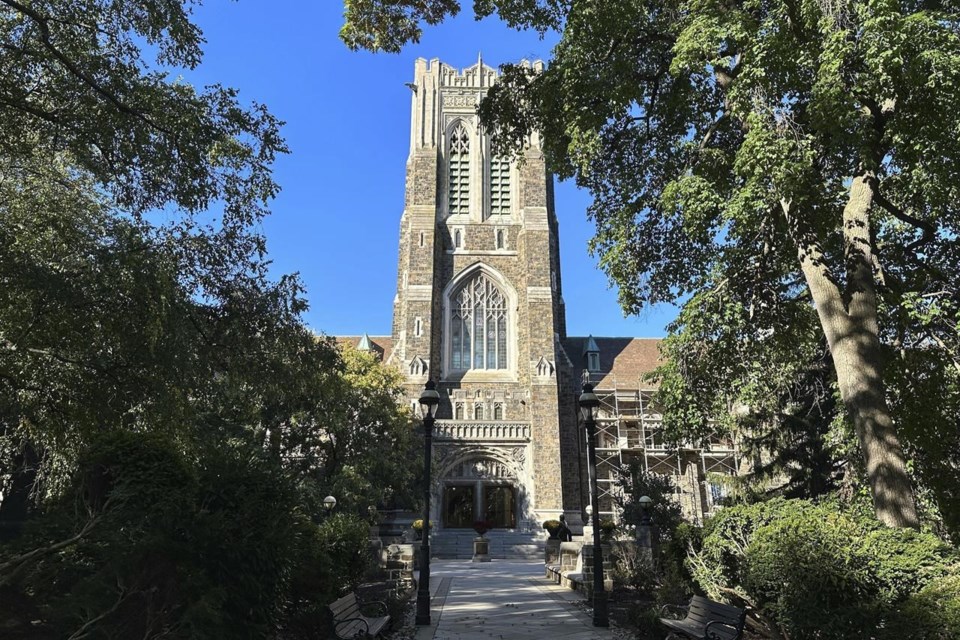BETHLEHEM, Pa. (AP) — Pennsylvania's absence of federally recognized tribal nations means there's been an incomplete picture of its Native American culture and history, officials said Friday as they announced a grant-funded program designed to change that.
The Pennsylvania Tourism Office, in partnership with Lehigh University's Institute for Indigenous Studies and with input from federally recognized tribes, will develop a plan to highlight the state's Indigenous stories, culture and history through a grant from the Appalachian Regional Commission.
Pennsylvania is behind other states in its consideration of Indigenous culture and history, compared with Midwestern states, said Jason Hale, a researcher from the Institute for Indigenous Studies, Lehigh University. Hale is from the Prairie Band Potawatomi Nation near Mayetta, Kansas.
The grant will allow them to change that.
“It comes right under the mission of what we do to connect and to help Indigenous tribal nations grow and become healthier,” he said, noting that the institute is within the College of Health, in which the research team works to address health and educational disparities among Native Americans.
“So we feel this is a great start and lays the foundation for what we can do as an institute working with Lehigh University within our College of Health and in the Greater Lehigh Valley community,” he said.
Tribal nations in Pennsylvania have largely been erased, and some, such as the Susquehannock and Monongahela peoples, do not exist any longer, said Andrea Lowery, executive director of the Pennsylvania Historical and Museum Commission.
Some tribal nations consider Pennsylvania an ancestral homeland despite having been forced out of the state and despite the history of oppression and marginalization, she said.
“There’s a lot we’ve learned about Native American history in Pennsylvania through archaeological evidence and historic documents, but this does not present a complete picture,” she said. “The tribes are keepers of their culture, their language, their history. And their interpretation of this history is critical to try to understand Pennsylvania.”
Lehigh University's Bethlehem campus is home to the Delaware Nation of Oklahoma's extension Tribal Historic Preservation Office, which is part of their Lenape homelands. The Delaware Nation of Oklahoma will consult on the project, officials said.
Over the next two years, the Institute for Indigenous Studies will convene a group of scholars and tribal members to outline specific projects. The tourism office will then seek to bring the projects to fruition, said Carrie Fischer Lepore, deputy secretary of tourism at the Pennsylvania Department of Community and Economic Development.
“Right now, Indigenous nations receive almost no representation in Pennsylvania culture, and that’s a mistake,” she said during a news conference Friday at Lehigh University, “because Pennsylvania is steeped in Indigenous history, a rich history of food, travel, folklore and so much more.”
The hope is that some of the projects will be completed in time for the 250th anniversary of the Declaration of Independence, she added. The grant is for $100,000, and the tourism office is contributing another $100,000.
The history of Pennsylvania’s Native peoples has often been framed in terms of their interactions with Europeans, and particularly the conflicts that stemmed from the Europeans' arrival. The new grant-funded initiative aims to widen the lens.
The hope is to highlight and promote the stories, as well as better the economic opportunities of the Appalachian counties and Native people and tribal nations that want to take part, said Sean M. Daley, director of the Institute for Indigenous Studies at Lehigh University.
“While this project will not address all the problems Native peoples face nor fix them, it is at least a step in a new and right direction and will hopefully lead to long-term and ongoing dialogues and collaborations with Pennsylvania’s native peoples and tribal nations,” he said.
The Associated Press



